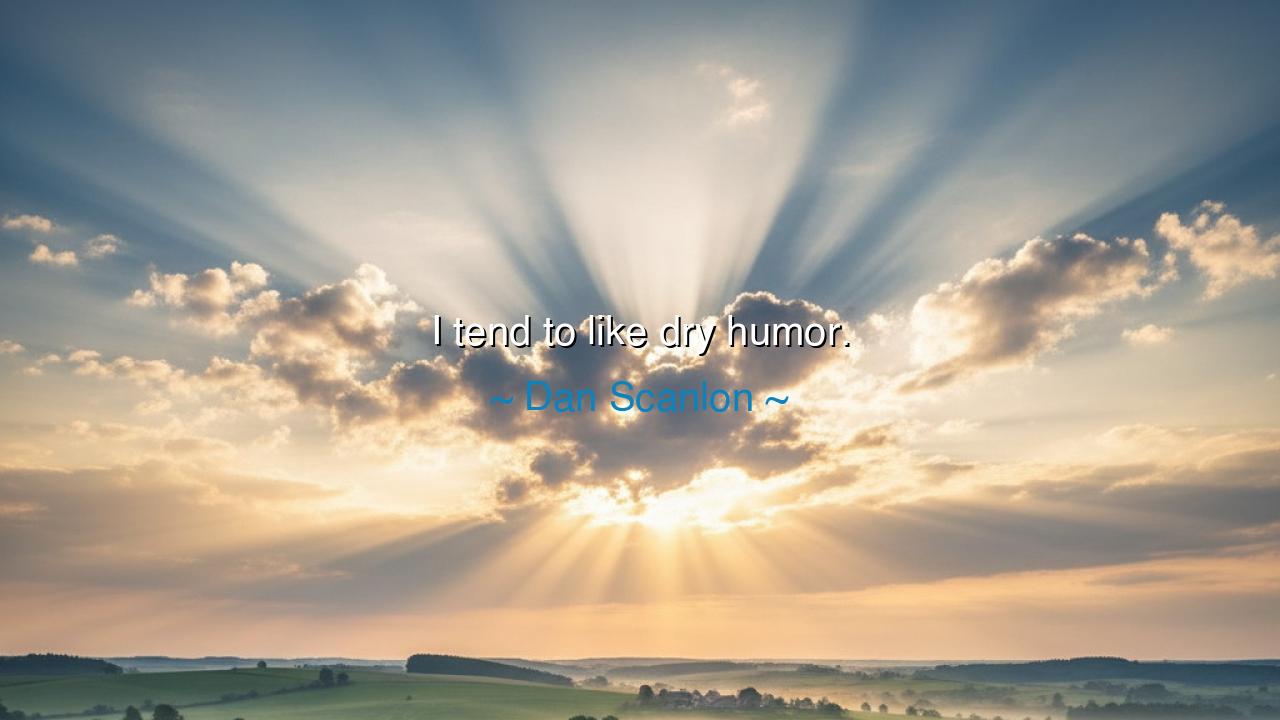
I tend to like dry humor.






When Dan Scanlon said, “I tend to like dry humor,” he was not merely speaking of a preference for a certain style of comedy — he was revealing something about how he sees the world, and how he finds meaning within it. For dry humor is no ordinary laughter. It is a subtle art, one that lives between silence and speech, between wit and restraint. It is the humor that does not shout, but whispers; the humor that demands thought before reaction. In a world that often prizes noise and exaggeration, Scanlon’s words remind us that truth, intelligence, and feeling can reside in quiet things — that even laughter can be wise.
The meaning of this quote lies in the spirit of understatement. To “like dry humor” is to delight in the interplay between irony and truth — to enjoy the wit that hides beneath a calm surface. Dry humor does not rely on spectacle or excess; it thrives on timing, tone, and subtlety. It is, at its core, the laughter of awareness — a recognition that life itself is often absurd, yet beautiful in its contradictions. Those who cherish dry humor are not those who mock the world, but those who understand it too deeply to take it at face value. They find amusement not in cruelty or chaos, but in the strange dance between human foolishness and wisdom.
In this way, Scanlon’s fondness for dry humor reflects a philosophy of balance. For humor, like life, has two paths: one loud, one quiet. The loud path seeks attention; it demands the room’s energy, pulling laughter by force. The quiet path, the dry path, invites reflection. It asks the listener to lean in, to think, to perceive. It is humor not of the tongue, but of the mind. The ancients understood this well. The philosopher Socrates, when accused of arrogance, responded with such sharp irony that his accusers could not tell if he mocked them or himself. His humor was dry — calm, unembellished, yet piercing. It revealed truth not by exaggeration, but by understatement.
Dry humor, too, is born from discipline of emotion. It is the laughter of one who feels deeply but shows little; the smile of one who sees folly yet chooses patience. Consider Abraham Lincoln, who during the most divided era of his nation, used wit as a weapon of peace. When criticized harshly, he replied with mildness and irony, saying, “If I were two-faced, would I be wearing this one?” The joke, simple yet profound, disarmed tension and turned hostility into humanity. Lincoln’s humor was dry — understated, intelligent, and steeped in compassion. It was a reminder that laughter, when wielded with wisdom, can bridge even the deepest divides.
In art and storytelling, this same principle holds true. Dan Scanlon, as a filmmaker and storyteller, uses humor not to distract from emotion, but to deepen it. Dry humor, when placed amid tragedy or sincerity, does not lessen the moment; it enriches it. It allows the audience to breathe, to see the fragility and resilience of life at once. It teaches that even in hardship, the human heart can find space for irony, for a knowing smile. In this, dry humor becomes not merely entertainment, but an act of grace — a way of saying, Yes, life is difficult, but we can still laugh at its absurdity without losing its meaning.
To embrace dry humor, one must learn the art of listening and observation. The loud joke demands reaction; the dry one rewards understanding. It requires patience, subtlety, and empathy — qualities often overlooked in our age of instant amusement. Those who love dry humor, as Scanlon does, find joy in the quiet wit of conversation, in the double meanings of language, in the way truth hides beneath simplicity. It is a way of seeing the world with both seriousness and levity — to hold knowledge and kindness in the same breath.
And so, my listener, let this be the lesson: seek depth, not volume, in your laughter. Let your humor — like your wisdom — be measured, compassionate, and thoughtful. Learn to smile at life’s contradictions without bitterness, and to see in irony not cruelty, but insight. For dry humor teaches humility — the ability to laugh without superiority, to joke without harm. It is the humor of the wise, the laughter of the heart that knows sorrow but chooses joy nonetheless.
Thus, Dan Scanlon’s simple statement becomes a timeless teaching: that the truest laughter is quiet, the most intelligent wit is subtle, and the deepest joy often speaks softly. Cultivate humor that invites reflection, that reveals truth, that strengthens the bond between minds rather than dividing them. In a world that roars for attention, let your laughter — like the whisper of dry humor — remind others that silence, too, can smile.






AAdministratorAdministrator
Welcome, honored guests. Please leave a comment, we will respond soon